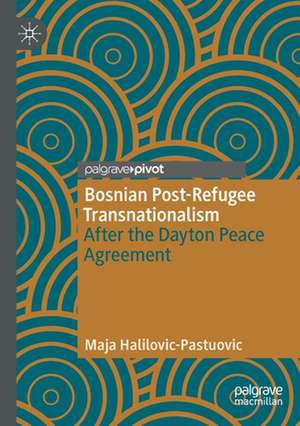Bosnian Post-Refugee Transnationalism: After the Dayton Peace Agreement
Autor Maja Halilovic-Pastuovicen Limba Engleză Paperback – 29 mai 2021
| Toate formatele și edițiile | Preț | Express |
|---|---|---|
| Paperback (1) | 378.34 lei 6-8 săpt. | |
| Springer International Publishing – 29 mai 2021 | 378.34 lei 6-8 săpt. | |
| Hardback (1) | 386.81 lei 6-8 săpt. | |
| Springer International Publishing – 28 mai 2020 | 386.81 lei 6-8 săpt. |
Preț: 378.34 lei
Nou
Puncte Express: 568
Preț estimativ în valută:
72.40€ • 75.93$ • 60.27£
72.40€ • 75.93$ • 60.27£
Carte tipărită la comandă
Livrare economică 01-15 aprilie
Preluare comenzi: 021 569.72.76
Specificații
ISBN-13: 9783030395667
ISBN-10: 3030395669
Pagini: 137
Ilustrații: VII, 137 p. 1 illus.
Dimensiuni: 148 x 210 mm
Greutate: 0.19 kg
Ediția:1st ed. 2020
Editura: Springer International Publishing
Colecția Palgrave Pivot
Locul publicării:Cham, Switzerland
ISBN-10: 3030395669
Pagini: 137
Ilustrații: VII, 137 p. 1 illus.
Dimensiuni: 148 x 210 mm
Greutate: 0.19 kg
Ediția:1st ed. 2020
Editura: Springer International Publishing
Colecția Palgrave Pivot
Locul publicării:Cham, Switzerland
Cuprins
Chapter 1 - Bosnian story: an introduction.- Chapter 2 - Bosnian post-refugee transnationalism: the theoretical context.- Chapter 3 - Bosnian post-refuge transnationalism and Ireland.- Chapter 4 - Bosnian post-refuge transnationalism and Bosnia.- Chapter 5 - Bosnian post-refugee transnationalism as the space of possibility.
Notă biografică
Maja Halilovic-Pastuovic is Senior Research Fellow in the School of Religion at Trinity College Dublin, The University of Dublin, Ireland. She specialises in the sociology of conflict with particular focus on post-Dayton Bosnia and Herzegovina. Her current research focuses on the subject of radicalisation in Europe and Balkan Peninsula.
Textul de pe ultima copertă
This book develops a new concept of post-refugee transnationalism to describe experiences of Bosnian refugees who settled in Ireland after fleeing the conflict in 1990s Bosnia and Herzegovina. The book explores their ambivalent relationship with their host and home countries, Ireland and Bosnia, arguing that their current experiences are best described as post-refugee transnationalism. Post-refugee transnationalism is characterised by Bosnians dividing their time between the two countries rather than permanently settling in either and by engaging in summer migrations and diasporic interconnections and affiliations. The book proposes post-refugee transnationalism as different to other instances of transnationalism by stressing its enforced origin provoked by the conflict and institutionalized by the Dayton Peace Agreement. The book combines Foucault’s biopolitics, David Theo Goldberg’s understanding of nation states as racial states and Giorgio Agamben’s expansion on the idea of potentiality, to develop the concept of post-refugee transnationalism.
Caracteristici
Develops a new concept of post-refugee transnationalism to describe experiences of Bosnian refugees in Ireland Proposes post-refugee transnationalism as different to other instances of transnationalism by stressing its enforced origin provoked by the conflict and institutionalized by the Dayton Peace Agreement Combines theories of biopolitics, of nation states as racial states and of potentiality to develop the concept of post-refugee transnationalism
